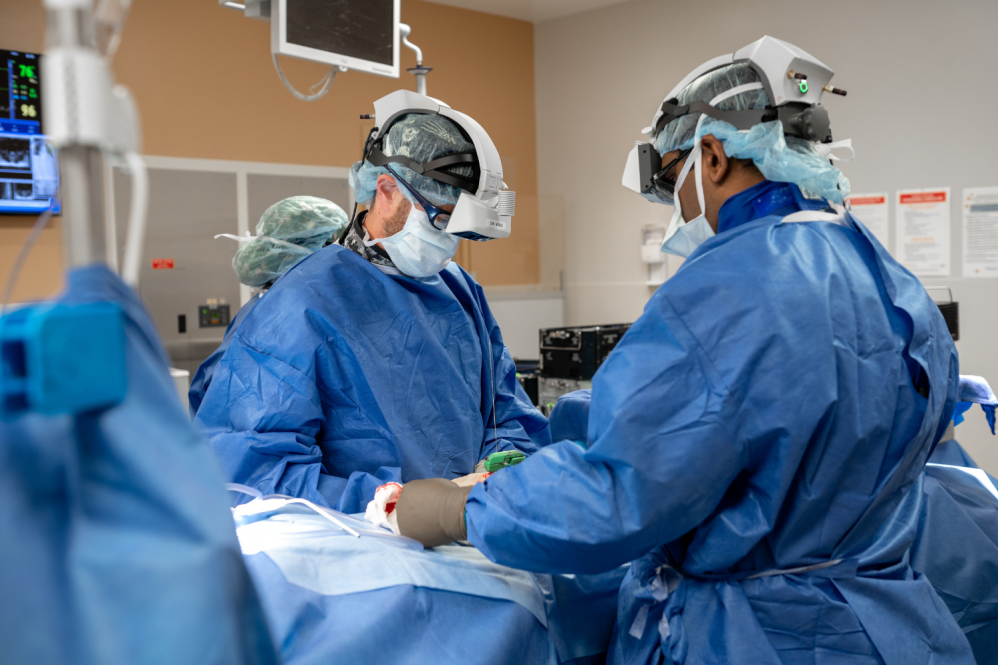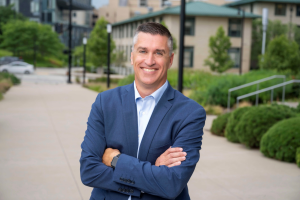Tysen Kendig admits the idea of spinal surgery was undoubtedly scary, but he knew going in that he had one of the very best surgeons in the business to fix his cervical stenosis leading to extreme confidence going into surgery but after the fact is even more impressed with the quality of care.

Dr. Isaac Moss performs spine surgery using augmented reality which provides real-time 3D imaging of the anatomy and projects it within the surgeon's field of vision for a new level of precision and safety. July 5, 2022 (Tina Encarnacion/UConn Health photo)
It was 2013, when Tysen Kendig was moving from Iowa to Connecticut for a job at the University of Connecticut that he first noticed he had a problem. He didn't think much of it at the time, but thought he might have strained something while moving boxes into his office. That evening he started to have a pain in his arm that radiated down his arm and into his chest.
Concerned it might have been a heart attack, he remembered driving past UConn Health while heading east on I-84. He drove himself to the Emergency Department where he was assured it was not a heart attack and was eventually introduced to Dr. Isaac Moss, chair, Department of Orthopaedic Surgery at UConn Health and co-director, Comprehensive Spine Center at the Brain and Spine Institute at UConn Health.

Over the next ten years his symptoms waxed and waned, but they remained manageable. Unfortunately, over a period of a week in April of 2023 he developed a constant numbness and tingling in the tip of his right index finger. It seemed odd, but not super concerning. However, as time passed, he started to develop a deep ache and pain inside the middle of his right arm around his elbow going up to his shoulder. Occasionally, his arm would get very cold, and he would get pins and needles in his hand that went from an intermittent nuisance to a constant problem.
He was initially evaluated by Dr. Cory Edgar, sports medicine specialist and associate professor of orthopedic surgery at UConn Health. Dr. Edgar determined that Tysen's symptoms were more likely stemming from a neurologic issue as opposed to a problem in the muscles or joints. Kendig then saw neurologist, Dr. Anthony Alessi, associate clinical professor of neurology and orthopedics, UConn Musculoskeletal Institute who completed a nerve test and concluded that the symptoms were likely stemming from nerve irritation in the cervical spine (neck).
It was then Kendig reunited with Dr. Moss who determined he had significant cervical stenosis, a narrowing of the spinal canal which can compress the spinal cord and nerves. When significant, this narrowing and nerve compression can affect a person's ability to move, sense of touch, and more.
"Every step of the way, everything was a team approach with the doctors at UConn Health, they all worked together to find what the issue was and then treat it appropriately," says Kendig, noting at one point that he had three physicians in the room at once evaluating his symptoms.
He started a stepped-up course of treatment that included physical therapy and X-ray guided epidural corticosteroid injections. The injections were helpful in relieving Kendig's arm symptoms; however, the relief did not last, and his symptoms eventually returned. Normal activities such as driving and even sleeping became increasingly difficult as the positioning worsened the pain, numbness and tingling.
After a long course of non-operative treatment over the course of year, Kendig and Moss decided that proceeding to surgery was the was the best option.
"When coming to UConn Health you have access to the brightest minds, and that provided me with a sense of great calm. After the fact, I'm even more impressed with the quality of care." – Tysen Kendig.
"The idea of spinal surgery was undoubtedly scary, but I knew going in that I had one of the very best surgeons in the business for this type of surgery, so I had extreme confidence," says Kendig. "When coming to UConn Health you have access to the brightest minds, and that provided me with a sense of great calm. After the fact, I'm even more impressed with the quality of care."
The surgery to perform cervical disc replacements is performed at the UConn Comprehensive Spine Center at the Brain and Spine Institute at UConn Health. The expertise in advanced spine care treatment options means faster recovery, greater precision, and improved safety for the treatment.
A small incision was made in the front of the neck to expose the upper spine. Once the spine was safely accessed, the damaged disks and bone spurs were removed. The disks were replaced with artificial mechanical replacements and a spacer to increase the space for Kendig's compressed nerves and spinal cord while maintaining motion of the neck.
"What amazed me was I came out of surgery, and I was walking around in four to five hours with no pain," says Kendig. "I felt great, so much so that the nursing staff had to constantly remind me that I just had major surgery and had to be careful doing things like don't bend down quickly and tie my shoes. But I was shocked that so quickly after surgery I was able to move around without pain. I remember thinking by the evening of surgery day 'okay, this worked exactly as planned.'"
Since the surgery Kendig has not had pain or tingling in the arm. Typically, with just two discs, the surgery can be done in outpatient surgery, but because he had three, he spent a night in the hospital.
The recovery from surgery was speedy with some expected pain at the incision site, irritation in speaking and mild difficulty swallowing the first few weeks, as is expected after this common procedure. Six months later, Kendig feels the clock has been turned back more than 10 years, with full functionality and motion in his neck and no residual pain or numbness at all - and a new appreciation for those who helped him get back to this point.
"Everyone I met at UConn Health from the volunteer at the front desk of the hospital, the transport staff, nurses and doctors were all amazing and incredibly responsive and upbeat," says Kendig, who has even started swinging a golf club again and resuming a full array of physical activities he did before the surgery. "UConn Health Sports Medicine has always provided top-level care for my family, especially my athlete sons. But I was blown away and remember feeling like everyone went the extra mile to make me feel comfortable during my procedure, including sharing plenty of laughter. I feel great, and I couldn't have hoped for a better inpatient experience anywhere."
The Comprehensive Spine Center at UConn Health helps thousands of patients each year with spinal conditions ranging from the most routine to the most complex. Our neurosurgeons, orthopedic surgeons, physiatrists, and physical therapists work together under one roof to help you get back to sports, work, hobbies, or simply enjoying life. We pair compassionate care provided by the region's most experienced team with the most advanced medical and surgical treatments available.






